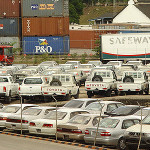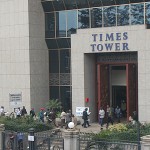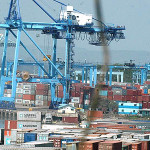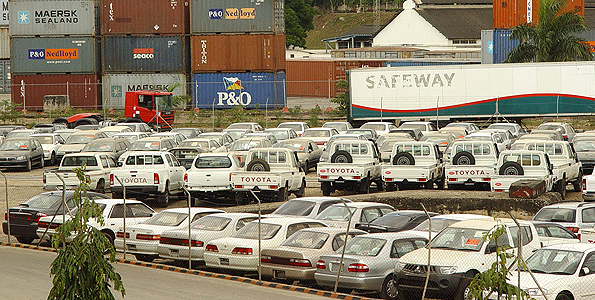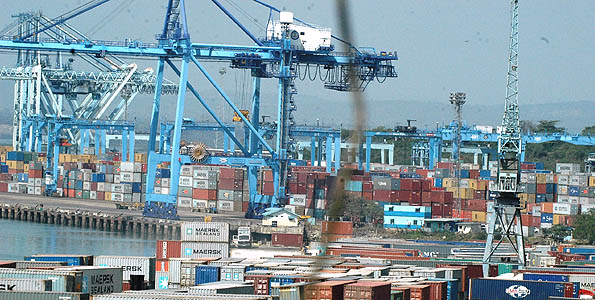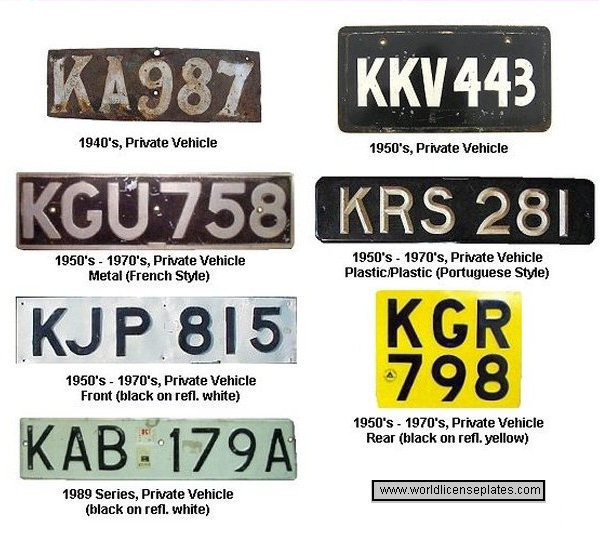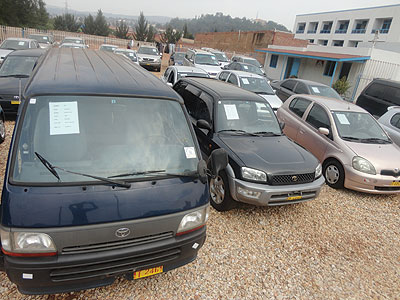Taxman locks horns with Kebs over used car imports
 The taxman is losing millions of shillings in a racket involving the sale of second hand cars illegally imported with the support of the Kenya Bureau of Standards.The cars, whose volumes have risen to more than 800 units annually, are aged above the eight-year legal limit allowed for used cars in the Kenyan market and are shipped in through a legal window that was opened in a gazette notice five years ago.
The taxman is losing millions of shillings in a racket involving the sale of second hand cars illegally imported with the support of the Kenya Bureau of Standards.The cars, whose volumes have risen to more than 800 units annually, are aged above the eight-year legal limit allowed for used cars in the Kenyan market and are shipped in through a legal window that was opened in a gazette notice five years ago.
Mukhisa Kituyi, the then Industrialisation minister, opened the special window in 2005 with the publication of a notice that allowed importation of cars aged beyond the set limit in cases deemed to be in ‘the public interest’. Motor vehicle dealers have, however, teamed up with Kenya Bureau of Standards (Kebs) to give the said public interest a broader interpretation that has opened the floodgates for over-aged and undervalued cars to enter the local market with little money accruing to the taxman in form of revenues.
It is estimated that the Kenya Revenue Authority (KRA) loses 40 per cent of import duty payable on every car aged more than eight years. KRA says the unscrupulous traders illegally shipped in more than 400 such cars in the first six months of this year, sparking a vicious battle between the taxman and Kebs, which is being accused of abating the racket.
Commercial lawyers say the public interest referred to in the gazette notice is intended to be invoked in cases where vehicles have been donated to institutions for use in humanitarian causes or in development projects such as those involving people living in the slums.
Interpretation of what constitutes ‘public interest’ is at the centre of the dispute between KRA and the standards regulator. Official correspondence between the two public agencies indicates that exemption letters written by Kebs officials are being used to routinely ship in overage vehicles for sale in the local market. KRA says that in the first six months of 2010 alone at least 454 units of old vehicles were allowed into the country in contravention of the Standards Act.
This is a significant number given that the 17 local vehicle distributors and assemblers of new vehicles under the aegis of Kenya Motor-vehicle Industry Association (KMI) collectively sold 8,033 in the first nine months of the year.
Last week, the Kenya Auto Bazaar Association (KABA) - a lobby group for second hand motor dealers - moved swiftly to deny culpability in the illegal trade even as the taxman insisted they are the main purveyors of the trade.
“We have ourselves been fighting this crime for a long time because those who are using the legal loophole to violate the age limit rule are not genuine car dealers but well connected crooks looking for quick kickbacks,” said Mr Charles Munyori, the Association’s secretary general.
KRA records show that top government officials are among the latest beneficiaries of the exemption clause. The documents show that a single individual was allowed to import as many as 8 vehicles over the six month period on the basis of special exemptions granted by Kebs.
“It is well known that senior government officials are involved in the importation of overage and seriously undervalued cars and trucks,” said Mr William Lay, the KMI chairman. The steep rise in the number of undervalued vehicles in the local market, he added, was one of the factors that have forced the three local assemblers to scale down their operations to 25 per cent of installed capacity – amounting to millions in lost revenues and jobs.
Under the Standards Act, all imported vehicles must be subjected to further tests before clearance at the port of Mombasa even after producing the certificate of inspection and roadworthiness from bodies such as JAAI.
There is however suspicion that some shrewd individuals are using their political connection to evade the normal procedure. Industrialisation minister Henry Kosgey could not be reached for immediate comment as his cell phone went unanswered but his aides blamed the mess on KRA officials.
“It is true that the age limit rule is a Kebs issue but KRA is electronically linked to Japan Auto Appraisal Institute (JAAI) and does not have to wait until the vehicles arrive in Mombasa to inform the importers that their vehicles are overage after collecting duty from them,” said Mr Samson Mosonik, the minister’s personal assistant.
The majority of those who seek letters of exemption, he added, are genuine individuals who have paid all the requisite duty with KRA.
“The minister listens to their presentations and grants exemptions to deserving cases only and we don’t understand why KRA refuses to honour the letters,” he said
High influx of old vehicles has raised eyebrows, prompting investigations by the tax man and the Kenya Anti Corruption Authority (Kacc). The probe revolves around whether government officials are colluding with cartels to import vehicles in contravention of the law. At the sidelines of KRA taxpayers week which begun yesterday, Commissioner General Michael Waweru said hundreds of overage vehicles currently trapped at the port will be destroyed the same way the authority handled 1,000 vehicles imported in breach of the law last year.
“We have suspended the clearance of any vehicle that is more than eight years old until the ambiguity in the exemption clause is clarified to us,” Mr Waweru told the Business Daily.
“Standards are there to be adhered to and we cannot keep the eight year threshold in our laws while we are still letting in hundreds of vehicles on the strength of exemption letters,” he said.
Abuse of the exemption clause crystallised recently with the arrest of John Mibei Kipngetich, an administration police constable attached to Industrialisation ministry over the importation of over-aged cars. Mr Kipngetich was subsequently charged with soliciting Sh50,000 from an importer and receiving Sh30,000 as an inducement to facilitate release of a letter of exemption from the 8 year rule.
In a letter written to the administration police commandant on August 26, KACC calls for the suspension of the police constable under the Anti-corruption and Economic Crimes Act. The new controversy surrounding the exemption clause comes hardly two weeks after a delegation of Kenya Private Sector Alliance (Kepsa) petitioned President Kibaki to scrap it altogether.
Sources privy to minutes of the meeting said President Kibaki directed line ministries review the matter.Kepsa officials also appealed to the government to live up to its budgetary pledge of procuring vehicles from local assemblers.KABA has however warned against using the age limit to confer the local assemblers monopolistic status saying only a few Kenyans can afford new vehicles that they sell.
“This country consumes at least 100,000 units of vehicles every month - including those that replace old and crashed vehicles – and this kind of demand cannot be met by the three operating assemblers,” said Mr Munyori.
The association said its members currently account for 99 per cent of the local vehicle market share.
Written By: George Omondi
Adopted From: www.businessdailyafrica.com/Corporate News/-/539550/1035382/-/11ollkjz/-/

